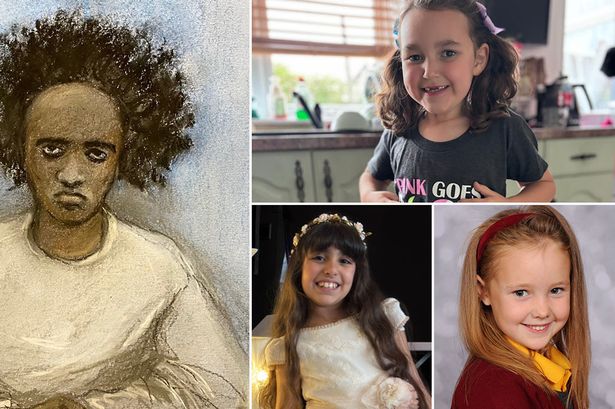The quiet seaside town of Southport, Merseyside, was irrevocably shaken on a summer day last year by an act of unimaginable violence. Axel Rudakubana, a name now etched in infamy, brutally murdered three young girls: nine-year-old Alice da Silva Aguiar, six-year-old Bebe King, and seven-year-old Elsie Dot Stancombe. The horrific crime sent shockwaves through the community and beyond, leaving residents struggling to comprehend the senseless loss of innocent life. The details of the crime, though mercifully spared from public consumption during the initial phases of the investigation, painted a picture of unspeakable horror. The girls, vibrant and full of life, were robbed of their futures in a single act of barbarity. The collective grief and trauma endured by their families and the wider community are immeasurable. The impact of this tragedy continues to resonate deeply, forever altering the landscape of Southport.
The opening day of Rudakubana’s trial brought a sudden and chilling end to the speculation surrounding the case. His guilty plea, entered before the court could even begin to delve into the harrowing details of the murders, was a stark admission of his culpability. While this plea spared the families the further agony of a protracted trial, it also robbed them of the opportunity to hear a full account of what transpired and potentially gain some semblance of closure. The admission of guilt, while confirming the dreadful truth, could not erase the pain or answer the lingering questions that haunted those affected by the tragedy. The court, now tasked with determining an appropriate sentence, faced the immensely difficult task of balancing the gravity of the crime with the legal framework of justice. The lives lost could never be truly compensated for, but the legal system held the responsibility of ensuring that Rudakubana’s actions met with appropriate consequences.
The community’s response to the murders was a complex tapestry of grief, anger, and disbelief. Southport, a town known for its family-friendly atmosphere and tranquil seaside charm, struggled to reconcile its image with the darkness that had descended upon it. Vigils, memorial services, and community gatherings provided spaces for collective mourning and a shared expression of grief. Flowers, teddy bears, and handwritten messages adorned impromptu memorials near the sites connected to the tragedy, serving as poignant reminders of the young lives lost. However, the shared grief was also intertwined with anger and a demand for justice. The question of “why” echoed through the community, a question that may never have a satisfactory answer.
The psychological impact of the murders extended far beyond the immediate families of the victims. The sense of security in the community was shattered, leaving parents grappling with anxieties about their children’s safety. The innocence and carefree nature of childhood were suddenly overshadowed by a stark awareness of the potential for violence. Support services and counseling were offered to help residents cope with the trauma, acknowledging the profound and long-lasting effects of such a horrific event. The community’s efforts to heal and rebuild were a testament to its resilience, but the scars of this tragedy would undoubtedly remain.
The case of Axel Rudakubana and the murder of Alice, Bebe, and Elsie raises broader questions about societal responsibility and the prevention of such tragedies. While no single factor can fully explain such heinous acts, exploring potential underlying issues such as mental health, access to support services, and societal influences can contribute to a greater understanding of the complex factors that can lead to violence. The focus should be on creating a safer society for children, one where such unthinkable acts are prevented rather than mourned. This involves a multi-faceted approach encompassing education, community support, and accessible mental health resources.
The legacy of Alice da Silva Aguiar, Bebe King, and Elsie Dot Stancombe should be more than just a reminder of a horrific crime. Their memory should serve as a catalyst for positive change, inspiring efforts to strengthen community bonds, improve child protection measures, and promote a culture of compassion and understanding. While the pain of their loss will endure, their lives can inspire a renewed commitment to creating a safer and more nurturing environment for all children. The community of Southport, while forever changed by this tragedy, can emerge stronger and more united in its dedication to ensuring that such a horrific event never happens again. The memory of these three young girls should be a beacon of hope, illuminating the path towards a future where children can grow and thrive in safety and peace.














